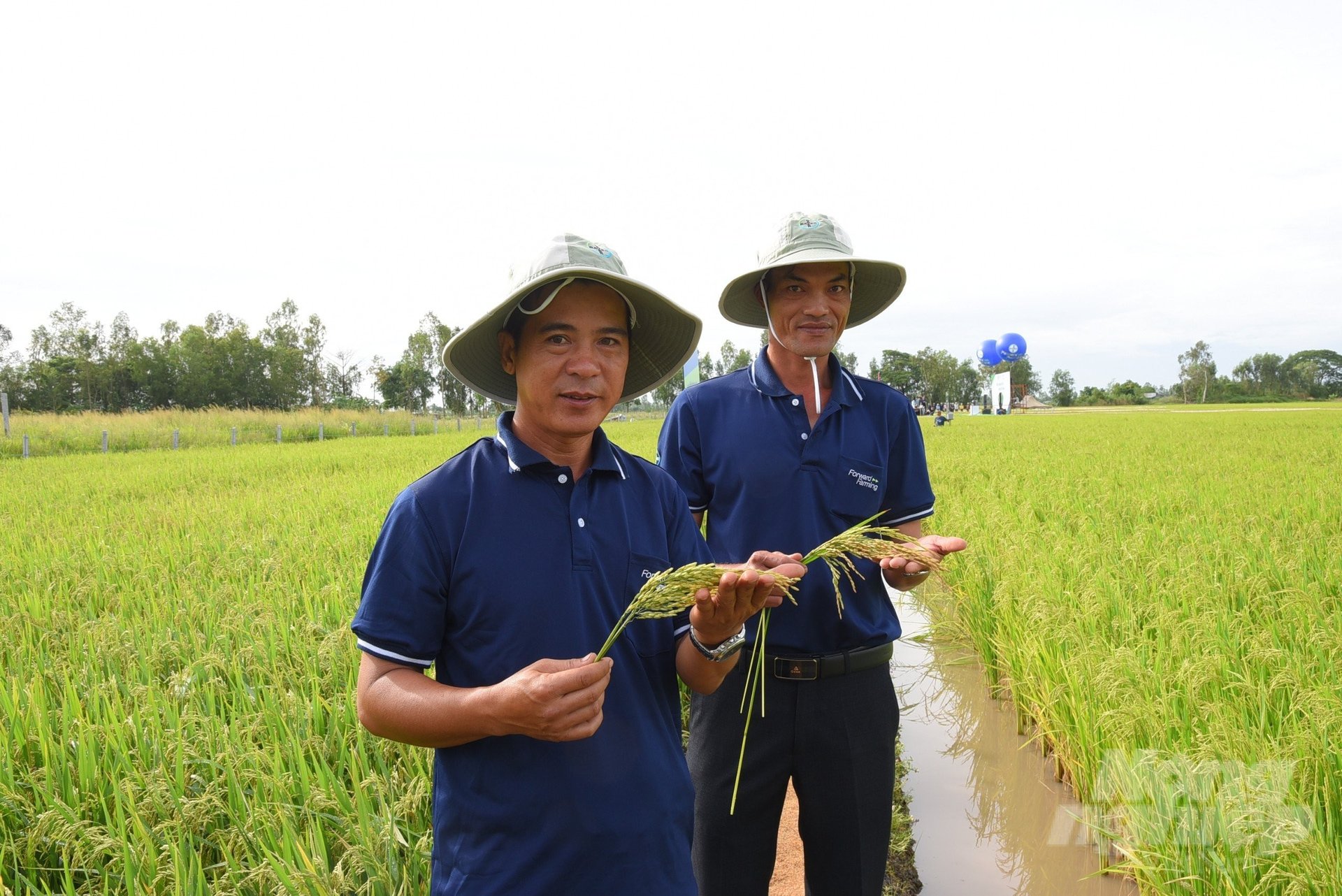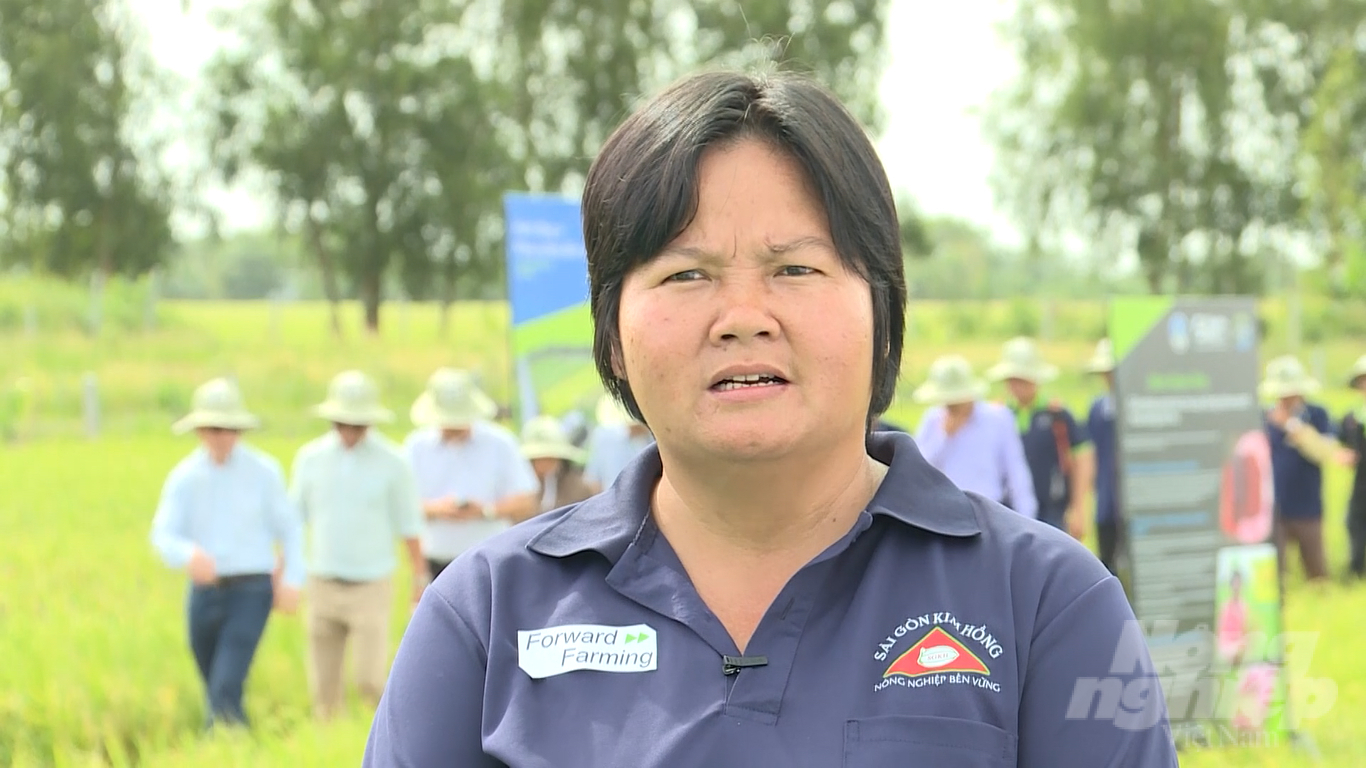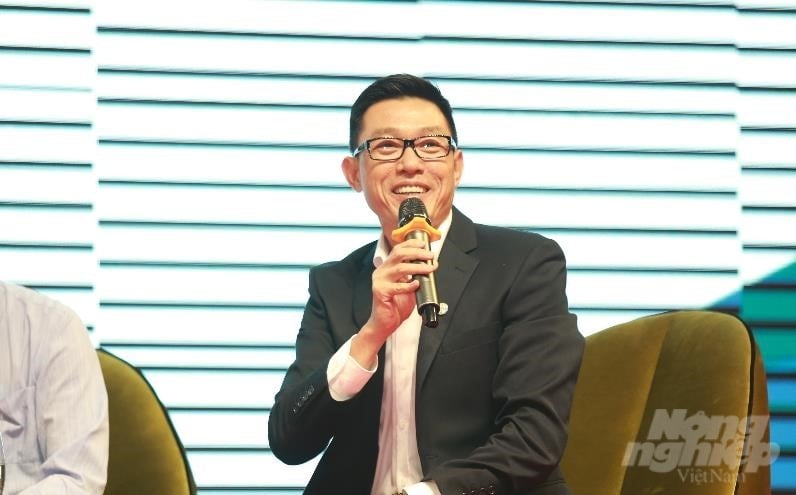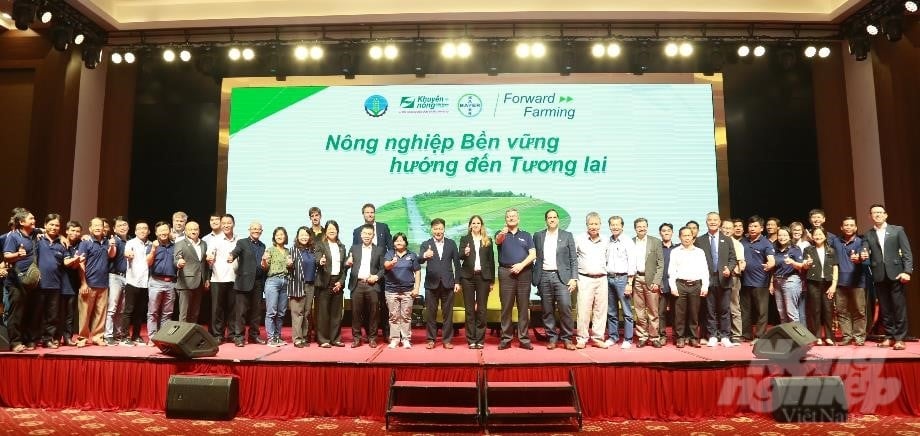November 27, 2025 | 20:16 GMT +7
November 27, 2025 | 20:16 GMT +7
Hotline: 0913.378.918
November 27, 2025 | 20:16 GMT +7
Hotline: 0913.378.918

Farmers Do Tri Hung (right) and Duong Van Sieu were thrilled to see their rice fields thriving with healthy plants, minimal lodging, long panicles, and well-filled grains with the assistance of the Forward Farming model. Photo: Ho Thao.
The launch event attracted numerous delegates, including experts, scientists, and farmers from neighboring provinces. Most farmers praised Mr. Hung's rice fields because they remained green, with healthy plants, minimal lodging, long panicles, and well-filled grains. Thanks to Bayer Vietnam Company and its partners' transferring of advanced farming techniques, farmers were able to reduce fertilizer and pesticide usage by approximately 50% compared to conventional methods.
After visiting the model, farmer Duong Van Sieu decided to participate in sustainable rice farming for his next crop. Mr. Sieu stated, "What I like most about the model is that it efficiently helps farmers save rice seeds, fertilizers, and pesticides. For rice farmers like us, these factors determine over 70% of the success of the crop."

Ms. Dao Thi Nhu He, Director of Saigon Kim Hong Trading and Services Company, sharing at the launch of the Forward Farm project. Image: Ho Thao.
Ms. Dao Thi Nhu He, Director of Saigon Kim Hong Trading and Services Company, after personally visiting the fields and observing Forward Farm, commented: "This model is special in that it helps farmers manage pests and control the volume of plant protection products effectively. Additionally, rice farmers no longer have to worry about pesticide residues when exporting their products". Ms. He also shared about her partnership with Bayer Vietnam and her commitment to coordinating closely to build a sustainable future for Vietnam's agriculture.
By participating in the Forward Farming program, Bayer Vietnam, along with its partners including Binh Dien Fertilizer Company and Saigon Kim Hong Trading and Services Company, has introduced the most advanced farming solutions from to rice farmers. The core goal of these solutions is to increase income and reduce production costs for farmers.

Mr. Chu Viet Ha, Director of the Crop Science Division under Bayer Vietnam, talking about the project's goals for Forward Farming.
Mr. Chu Viet Ha, Director of the Crop Science Division under Bayer Vietnam, highlighted several factors which contributed to the success of the Forward Farming project. Firstly, it was the shared vision of developing sustainable agriculture among the stakeholders, including the Ministry of Agriculture and Rural Development, the National Agricultural Extension Center, and both domestic and international private businesses.
Secondly, it was the collaboration of various agencies and businesses within the agricultural value chain, specifically the partnership between Bayer, Binh Dien Fertilizer Company, and Saigon Kim Hong Trading Company.
Thirdly, it was the use of the agricultural extension system. In a relatively short time, Bayer and its partners trained over 2,000 farmers to learn from this model and apply the results to their own fields.
The participation of the grassroots agricultural extension system will be a crucial element for Bayer Vietnam to expand this model in the long term and achieve greater, wider-ranging impact in the Mekong Delta region.

Bayer Vietnam, together with its partners, launching the Forward Farming project.
At the launch event, Mr. Le Quoc Thanh, Director of the National Agricultural Extension Center, highly praised the efforts of the partner organizations.
"With the Forward Farming project, we aim to provide over 100,000 farmers with knowledge and practical experience in sustainable agriculture through our agricultural extension network, utilizing both direct and online training. These efforts will play a crucial role in the Ministry of Agriculture and Rural Development's strategy to develop one million hectares of high-quality rice and promote sustainable growth in the Mekong Delta region."
Bayer Vietnam recently collaborated with the Anh Duong Community Support and Development Center to organize a volunteer day in Hau Giang.
Accordingly, the "Improving Living Conditions for Disadvantaged Households in Hau Giang from 2022 to 2023" Project aims to support the improvement of livelihoods, income, and the quality of life for 500 local households and individuals. Additionally, it provides opportunities for disadvantaged children to attend school, offers training on various topics related to health, self-care, and family planning for women, and encourages the local community to adopt sustainable practices in their daily agricultural activities to improve their health and livelihoods.
Translated by Nguyen Hai Long

(VAN) According to Mr. Vo Minh Thanh, Director of the Tay Ninh Department of Agriculture and Environment, Resolution 57 has created a new development pathway for the locality, shifting from traditional toward modern agriculture.
/2025/11/26/4909-2-154329_878.jpg)
(VAN) Pearl grouper farming in HDPE cages not only delivers economic efficiency but also contributes to protecting the environment, creating jobs, and promoting marine-based experiential tourism.

(VAN) The model of making a living under the forest canopy through the agroforestry system in Van Son commune, Bac Ninh province, is expected to generate an annual income of approximately VND 30 million/ha.

(VAN) Many enterprises in Can Tho are harnessing natural energy and reducing greenhouse gas emissions in their production processes, thereby contributing to the promotion of a sustainable green transition.
/2025/11/24/3536-2-112800_176.jpg)
(VAN) Dong Nai now has tens of thousands of hectares of forests certified for sustainable management, and this area will continue to be expanded in the coming period.

(VAN) Vinh Ha hamlet (Dai Xuyen commune, Hanoi) is shifting away from small-scale farming as households adopt bioscurity into their breeder chicken models.

(VAN) Heavy rains make aquatic species more vulnerable to disease. Proactive water management and high-tech systems help farmers prevent outbreaks and protect yields.